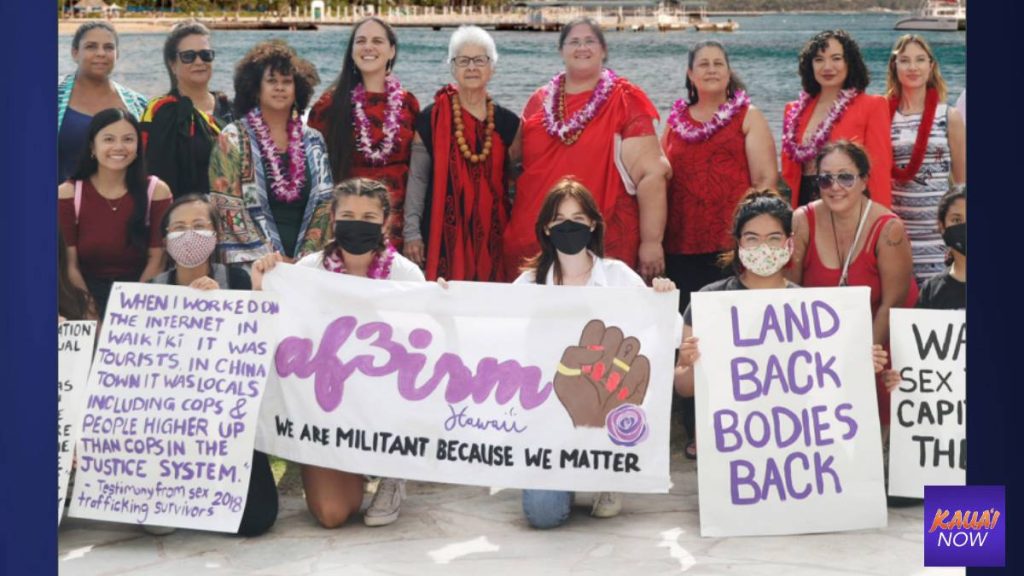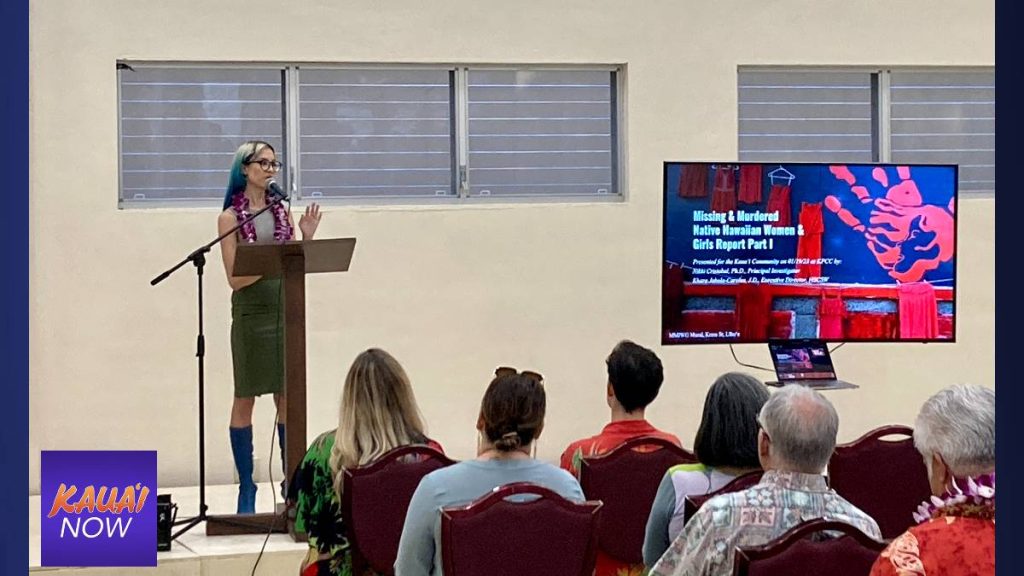Lawmakers pressed to tackle sex trafficking by Native Hawaiian women, girls advocates
Tia Obrero and Michael Blackstad went missing on their home of Kaua‘i on Valentine’s Day 2019, two months after their marriage.
Obrero, 26, was later found dead at Kitchens Beach in Wailuā. The body of her killer — her husband — was found the next day at another beach. Blackstad had committed suicide, according to police. Left behind were the couple’s 4-year-old daughter and 8-month-old boy.
From a dais in the Kaua‘i Philippine Cultural Center in Līhuʻe on Thursday night, Obrero’s sister, Kayli Obrero, told the audience: “Within hours, rumors had spread, swirled all around, of what people believed had happened. How could someone they know be capable of something so horrible?
“I had to not only mourn the death of my sister, I had to filter out the rumors that made their way back to me … I had to watch people who said that [Blackstad] cared about my sister post about her, when I know she’d asked them for help. And now they’re acting like her murderer was a saint.”
Obrero is a director of the O‘ahu-based nonprofit Women Speaking Out, a group behind statewide awareness campaigns to reduce dating violence.
She was one of several advocates to address Kaua‘i councilmembers, law enforcement officials, service providers and community members during the public meeting prompted by the recent publication of “Holoi ā nalo Wāhine ‘Ōiwi.”
The 23-page report, authored by Kaua‘i nonprofit director Nikki Cristobal for the Hawai‘i State Legislature, is the first of a two-part investigation of gender-based violence against Native Hawaiian women and girls. Its title in English means “to erase Native Hawaiian women completely.”

The report, produced by the Hawai‘i State Commission on the Status of Women’s Missing and Murdered Native Hawaiian Women and Girls Task Force, is an extension of an international movement originating in Canada and the continental United States in response to the disproportionate killing of Indigenous women and girls.
Cristobal, who recently discussed her findings with Kaua‘i Now, is now looking to expand the scope of the task force’s work. Part two of “Holoi ā nalo Wāhine ‘Ōiwi,” which will be released in December 2023, will be far more comprehensive than part one, she said Thursday.
“During this process, we found we had a lack of representation from critical entities that really should be at the table, such as the military, such as people in tourism, such as people from the coroner’s office, things like that,” Cristobal explained. “We’re going to move into qualitative data collection … interviews, narratives, survivor stories. We’re going to be working with communities to formulate solutions.”
Contributing factors to the problem – which sees Kānaka Maoli (Native Hawaiian) women and girls face greater risk of exposure to domestic violence, illicit drug use, poverty, sex trafficking and other threats – are many. Major components include the ongoing effects of colonialism and fragmented data collection by law enforcement and governmental agencies, according to the report.
But “Holoi ā nalo Wāhine ‘Ōiwi” could represent the beginning of a sea change.
U.S. Sen. Mazie Hirono of Hawai‘i, whose federal Violence Against Women Act was recently signed into law by President Joe Biden, held a roundtable discussion on Native Hawaiian gender-based violence at the Office of Hawaiian Affairs in Honolulu on Jan. 17.
Hirono’s legislation provides funding to Native Hawaiian survivors of sexual and gender-based violence, including sexual assault, sex trafficking, dating violence, domestic violence and stalking.
Roundtable speakers included Kalei Grant, who identified herself as a Native Hawaiian woman and survivor of commercial sex trafficking. The majority (43%) of sex trafficking cases in the State of Hawai‘i are Kānaka Maoli girls trafficked in Waikīkī on O‘ahu.
“It takes a village to raise a child, and it takes a community and then some to bring healing to one child after trauma is done,” said Grant, who works with the State of Hawai‘i Department of the Attorney General’s Missing Child Center-Hawai‘i. “I think accountability is really the key part of what I would like to see moving forward through all of our partner agencies … accountability to a level of ensuring that what we say at the policy level is actually what’s taking place on the ground.”
The department’s Special Investigation and Prosecution Division, created through legislation passed in 2022, touted its commitment to fight trafficking in Hawai‘i on National Human Trafficking Awareness Day on Jan. 11.
“The Department of the Attorney General takes extremely seriously the recent report regarding missing and murdered Native Hawaiian women and girls,” Hawai‘i Attorney General Anne Lopez told Kaua‘i Now. “We recognize that Native Hawaiian people suffer from disproportionately high levels of violence.
“The Special Investigation and Prosecution Division within the Department was recently created, in part, to address the issue of human trafficking in Hawai‘i. As the Division is established, it will engage in extensive outreach within the Native Hawaiian community and will provide protection, support and education to the most vulnerable members of our community.”
Khara Jabola-Carolus, the executive director of the Hawaiʻi State Commission on the Status of Women, said champions of Native Hawaiian women’s welfare “are few and far between” among state politicians in Honolulu.
Although there may soon be one more. Hours earlier, news leaked that Cristobal was one of three people nominated for the District 16 House seat vacated by Jimmy Tokioka.
And, there are several bills in the 2023 State Legislative Session that Jabola-Carolus believes may address some of the problems.

One is “Erin’s Law,” or Senate Bill No. 308, which would create a task force to review policies, programs, and curricula for educating public school students about sexual abuse and sex trafficking prevention. The task force’s findings would inform a systemwide sexual abuse prevention education program to be founded within the Hawai‘i Department of Education.
“I know for a lot of us, we automatically taught our kids, ‘Nobody touches that area.’ But we take it for granted,” Jabola-Carolus said. “Not every kid learns that. Not every child understands the sacredness of their body.”
Erin’s Law is named after childhood sexual assault survivor, author, speaker and activist Erin Merryn. As of January 2023, Erin’s Law has been passed in 38 states.
A review of all state house and senate bills introduced this legislative session, which can be found here, reveals several related to sex trafficking. These include:
- Senate Bill No. 235: Establishes a statewide prevention program overseen by the Department of the Attorney General to provide services and assistance to commercially sexually exploited children and to victims of human trafficking.
- Senate Bill No. 259: Specifies the penalty for sex trafficking shall be payment of a fine of no less than $50,000 but no more than $100,000, and a definite term of imprisonment of up to 20 years without the possibility of a suspended sentence, probation or parole. It also ensures minors who report they are a victim of sex trafficking shall not be subject to criminal liability.
- Senate Bill No. 356: Requires the department of education to offer training for teachers, educational officers and school-based behavioral health specialists on sex trafficking prevention and response.
Jabola-Carolus closed her portion of Thursday’s meeting on Kaua‘i by revealing she is a survivor herself.
“I have been drugged. I have been raped. I have been robbed at gunpoint. I have been hospitalized by domestic violence,” Jabola-Carolus said. “I have broken bones by someone who I was in love with, and I know it is easier to learn to love a man’s hate than to challenge it. But we have to pull each other forward. It is not going to require a miracle, but it is going to require a movement.”
- National Human Trafficking Hotline: (888) 373-7888
- Hawai‘i Department of Human Services child abuse hotline: (808) 832-5300
- Kaua‘i Police Department hotline: (808) 241-1711
- YWCA of Kaua‘i 24-hour Domestic Violence & Sexual Assault Hotline: (808) 245-6362
- Suicide & Crisis Lifeline: 988












